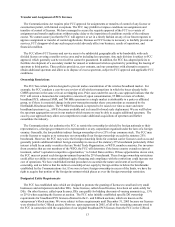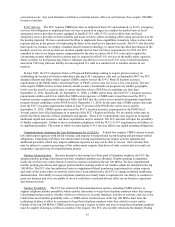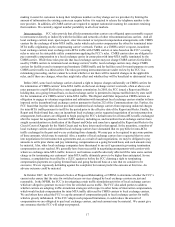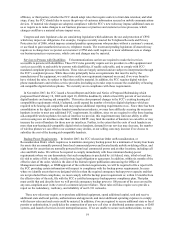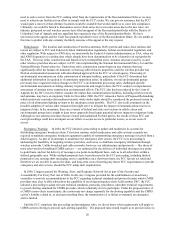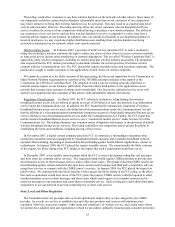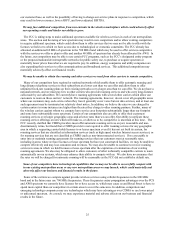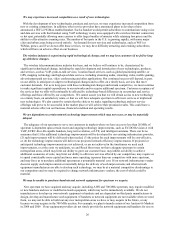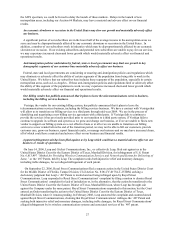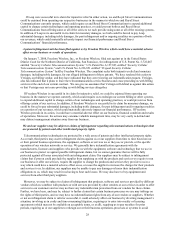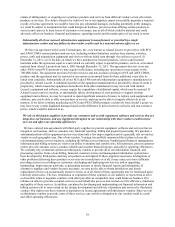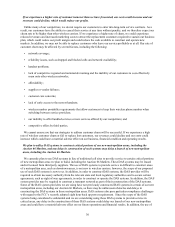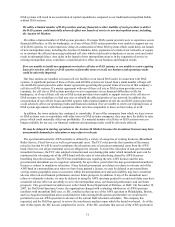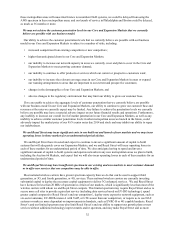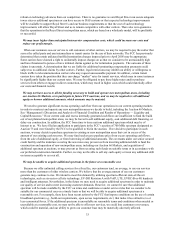Metro PCS 2007 Annual Report Download - page 34
Download and view the complete annual report
Please find page 34 of the 2007 Metro PCS annual report below. You can navigate through the pages in the report by either clicking on the pages listed below, or by using the keyword search tool below to find specific information within the annual report.23
issues and resolution of customer complaints. In addition, several state authorities have initiated actions or
investigations of various wireless carrier practices. The outcome of these proceedings is uncertain and could require
us to change our marketing practices, ultimately increasing state regulatory authority over the wireless industry.
State and local governments also may manage public rights of way and can require fair and reasonable
compensation from telecommunications carriers, including CMRS providers, for the use of such rights of any, so
long as the government publicly discloses such compensation.
A dispute exists between the FCC and certain state public utility commission advocates as to whether the FCC’ s
preemptive rights over rates allows the FCC to prevent states from prohibiting the use of separate line items on
wireless bills for charges that are not mandated by federal, state or local law. The FCC ruled in 2005 that states were
preempted from requiring or prohibiting the use of non-misleading line items on wireless bills. In 2006, the United
States Court of Appeals for the Eleventh Circuit vacated the FCC decision. The Supreme Court recently declined to
weigh in on this dispute. A similar case is currently pending before the United States Court of Appeals for the Ninth
Circuit. The outcome of these cases and the FCC’ s ultimate determination, which we are unable to predict at this
time, could affect the extent to which our CMRS services are subject to state regulations that may cause us to incur
additional costs.
The location and construction of wireless antennas, DAS systems and nodes, base stations and towers are subject
to state and local environmental regulations, zoning, permitting, land use and other regulation. Before we can put a
DAS node or site into commercial operation, we, or the tower owner in the case of leased sites, must obtain all
necessary zoning and building permit approvals. The time needed to obtain necessary zoning approvals, building
permits and other state and local permits varies from market to market and state to state and, in some cases, may
materially delay our ability to provide service. Variations also exist in local zoning processes. Further, certain
municipalities impose severe restrictions and limitations on the placement of wireless facilities which may impede
our ability to provide service in some areas. For example, New York City imposes a limit on how much space may
be occupied by wireless facilities on a single rooftop site. In addition, municipalities may deny zoning and building
permits based on local regulations and ordinances. If other municipalities impose restrictions on our ability to locate
facilities in their municipality, it could have an adverse effect on our ability to construct and launch service in new
metropolitan areas or to expand service in existing markets. A failure or inability to obtain necessary zoning
approvals or state permits, or to satisfy environmental rules, may make construction impossible or infeasible on a
particular site, might adversely affect our network design, increase our network design costs, require us to use more
costly alternative technologies, such as DAS systems, reduce the service provided to our customers, and affect our
ability to attract and retain customers.
Local zoning and building ordinances also may make it difficult for us to comply with certain federal
requirements, such as the back up power requirements imposed by the FCC. Although the FCC’ s rules allow
carriers to exempt sites which are precluded by state and local laws from compliance, we may be required to expend
a significant amount of money and effort to determine whether such sites are precluded from compliance under state
and local laws. In addition, the FCC rules may require us to seek alternative locations which may not be available or
may increase our costs, which increases could be material. Finally, federal, state and local air quality control
regulations may have an impact on our ability to place back up generators and other back up power supplies at
certain cites or may require us to undertake additional reporting requirements, all of which could have a material
adverse effect on our operations and financial results.
We cannot assure you that any state or local regulatory requirements currently applicable to our systems will not
be changed in the future or that regulatory requirements will not be adopted in those states and localities which
currently have none. Such changes could impose new obligations on us that would adversely affect our operating
results.
Future Regulation
From time to time, federal or state legislators or regulators revise existing legislation or regulations or propose
new legislation or regulations that could affect us, either beneficially or adversely. We cannot assure you that federal
or state governments will not enact legislation or that the FCC or other federal or state regulators will not adopt
regulations or take other actions that might adversely affect us.


